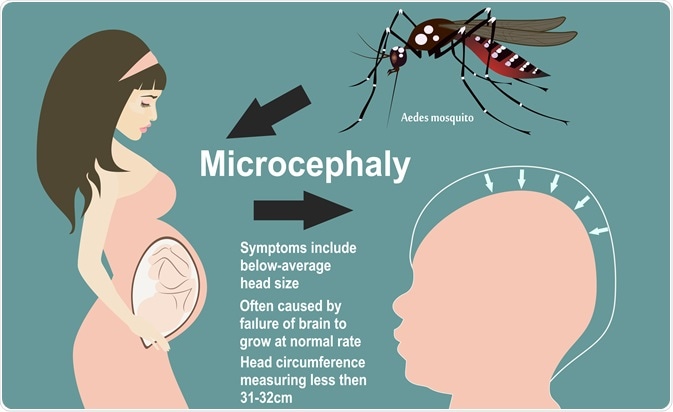The Zika virus, an infectious disease spread by Aedes mosquitoes, primarily in tropical environments, appears to have an impact on the development of babies in a human womb.
The symptoms that the Zika virus develops in a person who is infected with the disease include a fever, rash, aching joints, conjunctivitis and headaches. However, around 80% of people show no specific symptoms at all. The severity of these symptoms is no different for a pregnant woman compared to other patients.
 Image Credit: Tetiana Yurchenko/Shutterstock.com
Image Credit: Tetiana Yurchenko/Shutterstock.com
How pregnant women should treat a Zika virus infection
There are no specific treatments for the Zika symptoms. Patients are advised to rest, drink plenty of water, take paracetamol to address aches, pains and fever and seek advice from a healthcare professional if they are already on some form of medication. Taking medicines such as aspirin and non-steroidal anti-inflammatory drugs is not advised.
Those with Zika should also take steps to prevent it from spreading from them to others by protecting themselves from further mosquito bites which could lead to others being infected. Zika is transmitted through the blood and this is what mosquitoes feed on when they bite.
The patient should cover their skin in a repellent containing N, N-Diethyl-3-Methylbenzamide (DEET), wear light-colored clothing to cover their body and use mosquito nets. There is also some mounting evidence that it may also be spread through sexual activity.
Risk of Zika virus affecting the fetus
The mother and the developing fetus inside her have two different blood circulation systems separated by a placental barrier. The barrier alters throughout each trimester of the pregnancy to include structures relevant to the development of the baby at that particular time. However, the Zika virus can pass through the placental barrier to infect the developing fetus.
During the second half of 2015, there was an increase in Zika virus cases in Brazil as well as an increase in microcephaly cases in new-born babies. This has led to a suggestion that there is a connection between the two. In microcephaly, an infant is born with a smaller than usual head. The child will have some brain damage either from the reduced head size or due to brain damage while in the womb.
April Vital Signs - Zika Virus: Protecting Pregnant Women and Babies
Detecting microcephaly in the womb
Ultrasound, a technology using sound waves, can help medical staff to view the development of babies in the womb. From about 20 weeks of growth, ultrasound can detect whether the fetus has a smaller than standard head that might indicate microcephaly. A smaller head is not always due to microcephaly however so progress needs to be monitored carefully.
Magnetic Resonance Imaging (MRI), a technology that uses strong magnetic fields and radio waves, can be used in conjunction with ultrasound to determine whether there is any structural damage to the developing brain of a baby.
Another test that can be employed is an amniocentesis test. Medical staff can extract a sample of the mother’s amniotic fluid from the amniotic sac where the baby is developing, to see if there are any traces of Zika virus. However, there is a risk of miscarriage with testing the amniotic fluid.
Active Zika virus has been detected in two babies that died within 48 hours of birth in Brazil according to scientists from Rio’s Federal University, Fiocruz Institute and Paraiba’s Professor Amorim Neto Research Institute.
.jpg) Image Credit: Kateryna Kon/Shutterstock.com
Image Credit: Kateryna Kon/Shutterstock.com
References
Further Reading
Last Updated: Mar 11, 2023